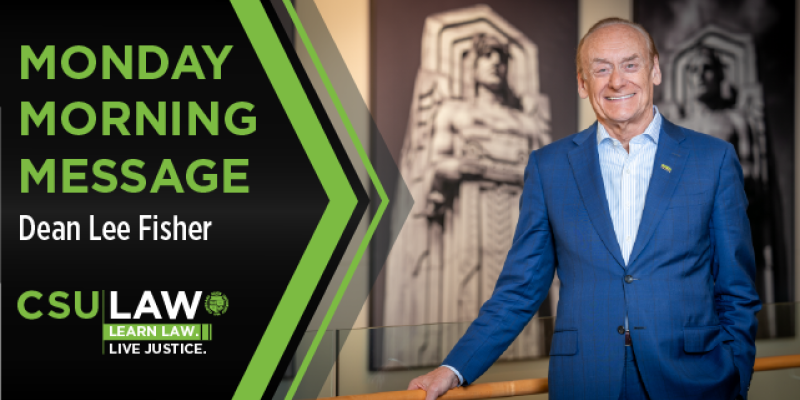
“Even though I know the river is wide
I walk down every evening and I stand on the shore
And try to cross to the opposite side.” -Billy Joel, The River of Dreams
Fifty years ago from this past Saturday, June 22, 1969, the Cuyahoga River caught fire when sparks from a passing train set fire to oil-soaked debris floating on the water’s surface. After Time Magazine published photos of the burning river, Cleveland became the butt of late night show jokes and Randy Newman's song "Burn On" became a hit.
But something else happened. Cleveland’s burning river became a symbol for America’s mounting environmental issues and sparked legislative reforms such as the passage of the Clean Water Act and the creation of federal and state environmental protection agencies. Once declared “dead” by the national media, the Cuyahoga River is now home to about sixty different species of fish and home to the The Foundry, Cleveland’s nationally acclaimed rowing and sailing center.
In the words of Billy Joel’s River of Dreams, we crossed to the other side.
The story of the Cuyahoga River burning, the Great Chicago Fire of 1871, Hurricane Katrina, and countless other tragedies that have beset our cities is not about the fire or the hurricane. The story is about what happened next.
In the wake of these tragedies, remarkable moments emerged from the ashes. Engineers, artists, architects, entrepreneurs, and community leaders, rather than close their eyes to the past, embraced it. They came together to rebuild.
One the most impressive digital hubs in the country is named after the Chicago Fire of 1871. 1871 is the home of nearly 500 early-stage, high-growth digital startups in Chicago’s The Merchandise Mart. It’s also the home of the Illinois Science and Technology Coalition and satellite offices for Northwestern University, University of Illinois, University of Chicago, Loyola University Chicago, Illinois Institute of Technology, Trinity University, and DePaul University.
Why do some communities -and people- rebound after a crisis while others sink into despair? The answer is resilience.
Doris Kearns Goodwin, in her book, Leadership in Turbulent Times, notes that dramatic reversals shattered the private and public lives of Presidents Abraham Lincoln, Teddy Roosevelt, Franklin Roosevelt, and Lyndon Johnson. She writes,“Abraham Lincoln suffered a blow to his public reputation and his private sense of honor that led to a near-suicidal depression; Theodore Roosevelt lost his young wife and his mother on the same day; Franklin Roosevelt was struck by polio and left permanently paralyzed from the waist down; Lyndon Johnson lost an election to the United States Senate.”
More important than what happened to them was how they responded.
At Cleveland-Marshall College of Law at Cleveland State University, we’re very proud of the excellent passage rate of our graduates who take the Ohio Bar Exam each year (highest of Ohio’s nine law schools). However, I was concerned that in the midst of our annual celebration, we ignored those graduates who did not pass the exam. So each year I write the following letter to those graduates who did not pass.
“I want you to know we share in your disappointment, but we continue to believe in you and in your ultimate success. Each of you has been a high achiever in your life, and for some of you, this may be your first failure. Unanticipated and unwelcome developments in a career path can open new doors. It may not feel that way right now, but you can turn this into something positive. I don’t pretend to know or understand how you are feeling, but I want to share some thoughts based on my own experiences. Although I’ve had the great privilege of serving in state public office for 18 years, I also had my share of setbacks along the way. From President of Fernway Elementary School through my first 14 years in public office, I never lost an election.
All that changed in 1994 when I barely lost my re-election for Ohio Attorney General. I was stunned and for a while I not only experienced loss, I felt lost. In 1998, I barely lost my race for Governor. I was hurt. In 2010, I lost my race for the U.S. Senate. I was disappointed. Each time I lost, over 11 million people knew that I had failed to pass my election exam.
But each defeat led me to a new, unanticipated, exciting opportunity, and my last defeat put me on a path that led me to where I am today- the best job I’ve ever had among many great and fulfilling jobs. Each time I lost, I reached out to family and friends who were willing to share not just in my joy, but also in my pain.
I’ll never forget what my then 4-year-old daughter Jessica said when I lost my first election in 1994. Jessica was crying, and said, “Does this mean you won’t be my Daddy anymore?” Her words helped me understand that my loss didn’t define who I was. Each time I lost, I failed up, not down, because I refused to allow my defeat to define me.
Don’t let this define you. You were not given this opportunity; you earned it. Youpursued your dream by living a few years of your life like most people won’t, so you could spend the rest of your life like most people can’t. Now, move forward.”
It’s not about the fire or the failure. It’s about how we respond.
This Week’s Monday Moment: The Comeback of the Burning River
Have a great day. Have a great week.
For copies of past messages, please go to this link: Monday Morning Messages.
Subscribe to Dean's Monday Morning Message
Subscribe to C|M|Law Newsletter
My views in all my Monday Morning Messages are my personal views alone and do not reflect the views of our law school or our university.
My best,
Lee
